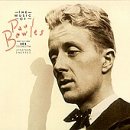It's Great To Be An American!
Matrina Lesko | 05/16/2001
(5 out of 5 stars)
"I have had a long-term interest in the missing generation of American composers -- that is, the generation of the '30s and '40s who tended to leftist views. Their most popular surviving members are Copland and Bernstein; but they also include Blitzstein, Bowles, Barber, Diamond, Foss, etc. I am quite grateful that they are slowly being rediscovered.My interest in Paul Bowles began with a performance script of Tennessee Williams' "The Glass Menagerie," which specified that no music other than the music of Paul Bowles was to be used in productions of the play. "Who dat?"Then I discovered "The Sheltering Sky," and a collection of his short stories, and an extremely exotic Morrocan autobiography called "A Life Full of Holes" that he translated. So, I thought, maybe he was really a writer who dabbled in music. But the recent biography of Copland said otherwise. Copland felt that he was very possibly the most talented of that generation. Then a door-stop sized biography of him came and went; more clues to his musical accomplishment but still, no music.I was beginning to suspect that Mark Blitzstein was the more talented among the relatively unknown members of that generation. And I had recordings of a recital of his songs, "The Cradle Will Rock," "Regina," and "The Airborn Symphony" which supported it.But this CD indicates a rush to judgment. I still adore Blitzstein, but Bowles is the better craftsman and far more ingenious in his creative approach to rhythm, form and instrumental color.This CD is just too much fun. Thanks to their French training under Boulanger, they all got a thorough appreciation of the entire battery of Stravinsky's various rhythmic, harmonic, and melodic tricks, including his ongoing appreciation for folk songs and dances. Even the arty songs on this CD are spicy. And I am simply dazzled by the concerto for two pianos. What enormous fun!May young scholars and performers continue to persue this repertoire and give it the fresh and refreshing interpretation it gets on this CD. It's great to be an American!"
Bowles as composer, a pleasant surprise
ernienl | Amsterdam, The Netherlands | 06/15/2000
(5 out of 5 stars)
"It was a surprise to me to find music of the famous author Paul Bowles. I have read Sheltering Sky and I was impressed by it. The CD booklet mentions a dual career for Bowles. Listening to his music I think it is a shame Bowles did not pursue a career as composer. He is by no means a mature composer, but the sincerity and passion of his music are very refreshing. His music is American, with strong influence of Copland. His sound is jazzy and romantic with latin influences. I was very impressed by the two vocal works on the disc. One, a zarzuala based on Garcia Lorca is an exiting piece of music with a latin touch. The other is a suite of six songs, beautifully sung by Kurt Ollmann. Overall the performers do a great job. It is clear they like the music and especially the voices are a good match for this kind of music. I gave it a 5 star rating because of the rareness of the music, the quality of the performance. I bought the disc as a gift and I find it hard to part from it."
Dissonant; the work of unfettered creativity
Timothy P. Scanlon | Hyattsville, MDUSA | 07/27/2000
(4 out of 5 stars)
"I like minimalists. For whatever reason I like the music of Adams, Glass, some of Reich, and especially the work of one composer whose work I chanced across: Ingram Marshall.On the other hand, I'd never heard of Paul Bowles. Then there was a concert at the Kennedy Center of various pieces for two (and three) pianos. The conductor preceded the performance of Bowles' Concerto for Two Pianos and Orchestra with the fact that Bowles is better known as an author than as a composer. I didn't know that, but I paid attention to the Bowles piece. It didn't have the melody or magic fingerwork of the pieces by Mozart, Mendelssohn, or even the piece by Poulenc. But I like it. It reminded me of the minimalists.I confess that I notice that concerto more than the other pieces on the disk; having seen it performed, I can relate to it more intimately. The booklet along with the CD says that Bowles spent a great deal of time in Tangier apparently fleeing from something in the U.S., probably something considered seditious at the time. During that exile, he, according to the booklet, picked up the influence of French composers. The booklet mentions Satie, Milhaud, and Poulenc. While I listen closely, what I notice is a touch of Ravel. And, since I find Ravel's music outstanding, who am I to criticize Bowles'?It's hard to describe any of the music. Much of it, again, is minimalist to me. It's dissonant, pops all over. Bowles himself said of one of his pieces, that "it's like a monkey jumping from one tree to another." Some of the six songs seem a bit somber, even funerary. (Maybe I'll have to listen to them more closely.) But it's all so soothing. Since Bowles was an author in addition to being a composer, there was a stream of creative juices flowing from and around him. The mixture--or lack--of styles in the pieces on this CD reveals talent, no doubt about that. But it was a talent not constricted by the norms of his would-be instructors, Aaron Copland and Virgil Thompson. For that I think his instructors would be happy.Get it and listen to it. It'll grow on you, and grow, and grow."


 Track Listings (33) - Disc #1
Track Listings (33) - Disc #1